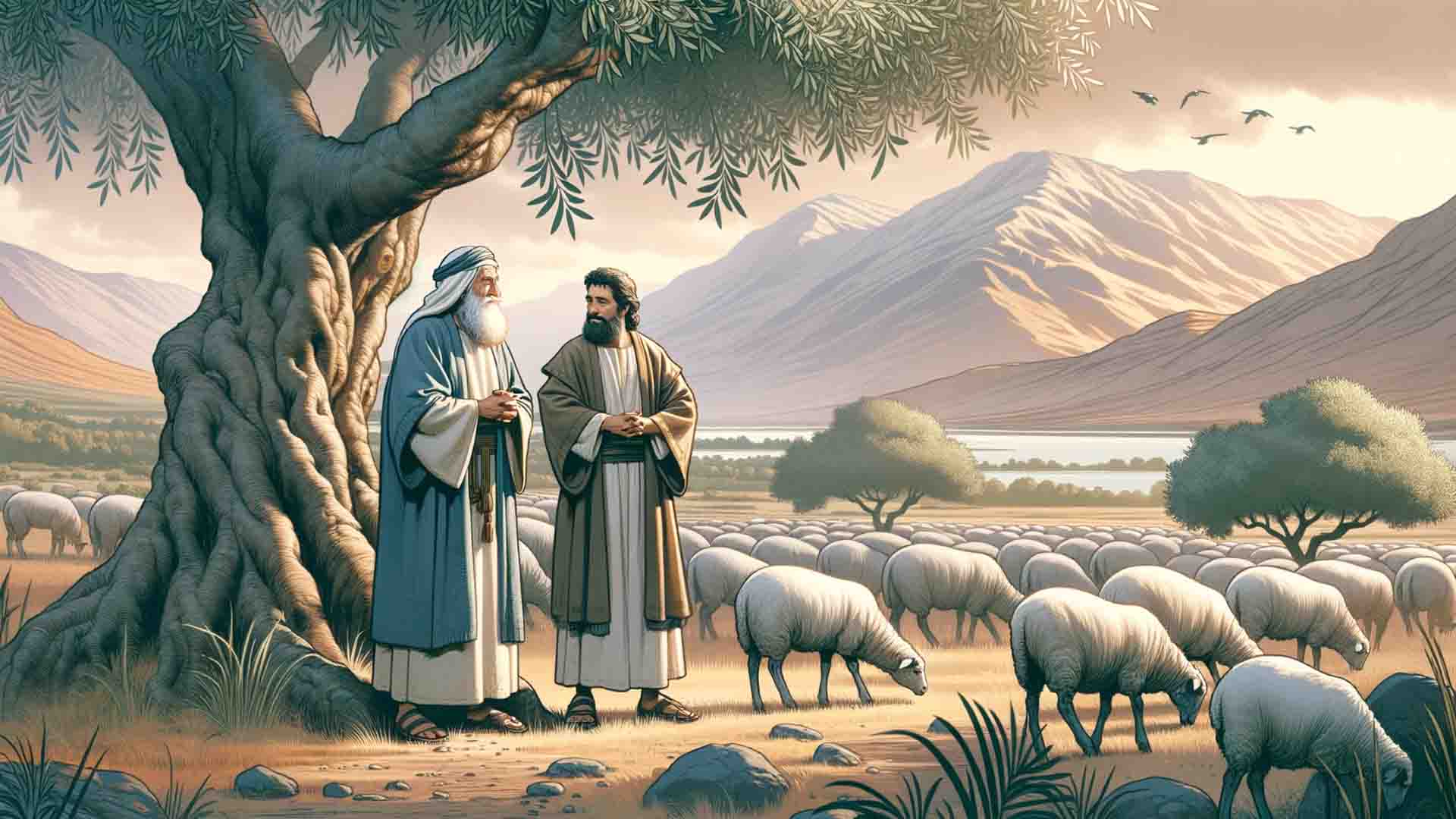Briefly and summarized about this part
After leaving Egypt, Abram, along with his wife, Lot, and their considerable possessions, returned to the area between Bethel and Hai. Here, Abram reiterated his devotion to God. Both Abram and Lot had grown exceedingly wealthy, leading to disputes between their herdsmen due to the land’s inability to support both their flocks. To avoid conflict, Abram proposed that they part ways amicably, allowing Lot to choose his preferred territory. Lot selected the fertile plains of Jordan, moving his dwellings near Sodom, despite its inhabitants’ notorious wickedness. Abram, on the other hand, settled in Canaan. With Lot gone, God promised Abram vast lands for his descendants, likening their number to the dust of the earth. Abram then made his home in Hebron, continuing his practice of building altars to worship God.
- Conflict Resolution and Generosity: Abram’s approach to resolving the dispute with Lot over land usage highlights the power of generosity and prioritizing relationships over possessions. In family or business disputes, taking the initiative to offer a fair resolution can prevent conflict and preserve important relationships.
- Decision Making and Consequences: Lot’s choice of the fertile plains of Jordan, based on appearance without considering the moral character of the neighboring communities, serves as a cautionary tale. It suggests the importance of weighing all factors, not just immediate benefits, when making decisions, especially those related to relocation or business ventures.
- Faith and Divine Promises: After Lot departs, God’s reassurance to Abram about the future of his descendants underscores the theme of faith in divine promises. This can be likened to having faith in our principles and beliefs, even when facing uncertainty or after making significant life changes.
- Stewardship and Gratitude: Abram’s accumulation of wealth and subsequent acts of worship through building altars illustrate a life of stewardship and gratitude. It’s a reminder that achieving success or wealth should be coupled with gratitude and giving back, whether through charitable acts, community service, or expressions of thanks.
- Walking the Land: God’s instruction to Abram to walk the land He promises to give him can symbolize the importance of understanding and appreciating what we have been given or have earned. This can translate into being proactive in our endeavors, taking the time to ‘walk the land’ of our professional and personal lives, fully engaging with and appreciating our surroundings and opportunities.
- Legacy and Impact: The promise that Abram’s descendants will be as countless as the dust of the earth highlights the concept of legacy. It encourages us to consider the long-term impact of our actions and how we can contribute to a legacy that positively affects future generations, whether through family, community involvement, or broader societal contributions.
Full text from The Bible
13:1 And Abram went up out of Egypt, he, and his wife, and all that he had, and Lot with him, into the south.
13:2 And Abram was very rich in cattle, in silver, and in gold.
13:3 And he went on his journeys from the south even to Bethel, unto the place where his tent had been at the beginning, between Bethel and Hai; 13:4 Unto the place of the altar, which he had made there at the first: and there Abram called on the name of the LORD.
13:5 And Lot also, which went with Abram, had flocks, and herds, and tents.
13:6 And the land was not able to bear them, that they might dwell together: for their substance was great, so that they could not dwell together.
13:7 And there was a strife between the herdmen of Abram’s cattle and the herdmen of Lot’s cattle: and the Canaanite and the Perizzite dwelled then in the land.
13:8 And Abram said unto Lot, Let there be no strife, I pray thee, between me and thee, and between my herdmen and thy herdmen; for we be brethren.
13:9 Is not the whole land before thee? separate thyself, I pray thee, from me: if thou wilt take the left hand, then I will go to the right; or if thou depart to the right hand, then I will go to the left.
13:10 And Lot lifted up his eyes, and beheld all the plain of Jordan, that it was well watered every where, before the LORD destroyed Sodom and Gomorrah, even as the garden of the LORD, like the land of Egypt, as thou comest unto Zoar.
13:11 Then Lot chose him all the plain of Jordan; and Lot journeyed east: and they separated themselves the one from the other.
13:12 Abram dwelled in the land of Canaan, and Lot dwelled in the cities of the plain, and pitched his tent toward Sodom.
13:13 But the men of Sodom were wicked and sinners before the LORD exceedingly.
13:14 And the LORD said unto Abram, after that Lot was separated from him, Lift up now thine eyes, and look from the place where thou art northward, and southward, and eastward, and westward: 13:15 For all the land which thou seest, to thee will I give it, and to thy seed for ever.
13:16 And I will make thy seed as the dust of the earth: so that if a man can number the dust of the earth, then shall thy seed also be numbered.
13:17 Arise, walk through the land in the length of it and in the breadth of it; for I will give it unto thee.
13:18 Then Abram removed his tent, and came and dwelt in the plain of Mamre, which is in Hebron, and built there an altar unto the LORD.

